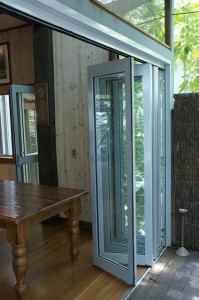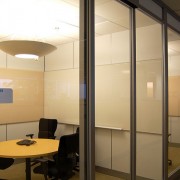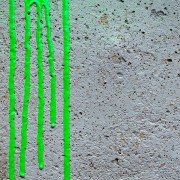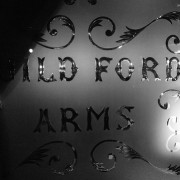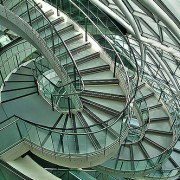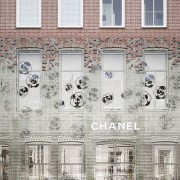Glass – the new luxury material
Disappearing glass walls – walls that fold neatly out of the way or tuck quietly into storage spaces – are becoming the norm in luxury developments. You can see a commercial example of the attraction of hideaway glass walls at the new San Francisco Apple store, where the store’s giant glass doors disappear during business hours.
Oceanfront, lakefront and even New York City property owners are going for glass to help bridge the distance between themselves and their preferred residential environments. Floor-to-ceiling doors that simply disappear into a pocket can really change the vibe of a building, but they require special structural considerations.
Glass is extremely heavy, and glass doors – or an entire glass wall – can weigh thousands of pounds. The rest of the structure must be carefully designed or reinforced to support a foldaway glass wall. The cost of such an addition is also not slight. The cost of a glass wall can exceed $125 per square foot, and that doesn’t include extra supports, motors and hardware to help move the doors into place.
Pocket doors – regardless of what they’re made from – require a lot of space, too. If you want to hide a door completely inside of a wall, you’ll need a wall space that’s at least double the size of the door opening.
Folding doors are less expensive and are more practical for most spaces. That’s because they require less space than glass pocket doors do, and they can be manufactured in more practical (read less custom) sizes.
Energy efficiency is also a consideration. Heat loss is the big concern in northern climates. Heat gain is the major consideration in climates that receive a lot of sun exposure. Using high efficiency glass can help reduce the energy loss or energy consumption related to the door.
Waterproofing is also a concern, since a wet door can do damage to the area around it, and can encourage the growth of mold and mildew in a space.
Glassprimer™ glass paint is a great way to control energy losses and prevent solar heat gain in glass installations. Glassprimer™ glass paint comes in virtually any color and creates a permanent bond with the glass surface. Its exceptional UV-resistance means that the paint will not chip, fade or peel even when exposed to direct sunlight.
If you’d like more information about Glassprimer™ glass paint, please visit the rest of our site. If you’d like to purchase Glassprimer™ glass paint, please visit our online store .
Photo Credit: Phillip Long, via Flickr.com

